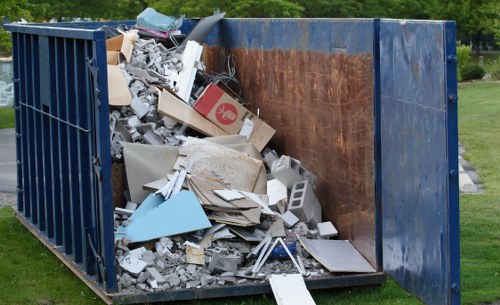Managing Builders Waste in East London: A Comprehensive Guide

East London has seen a significant surge in construction and renovation projects over the past few years. With this boom comes the inevitable challenge of managing builders waste effectively. Proper waste management is not only crucial for maintaining cleanliness and safety on construction sites but also for ensuring environmental sustainability.
Builders waste encompasses a variety of materials, including concrete, wood, metals, bricks, and plastics. The improper disposal of these materials can lead to environmental degradation, health hazards, and increased project costs. Therefore, adopting efficient waste management practices is essential for construction companies operating in East London.
In this comprehensive guide, we will explore the different aspects of builders waste management in East London, including types of waste, disposal methods, recycling opportunities, and regulatory requirements. By understanding these elements, construction businesses can enhance their sustainability efforts and contribute positively to the community.
Types of Builders Waste

Builders waste can be broadly categorized into several types, each requiring specific handling and disposal methods. Understanding the nature of these wastes is the first step towards effective management.
1. Concrete and Masonry: This includes broken bricks, concrete blocks, and other masonry debris. These materials are often heavy and require specialized disposal methods.
2. Wood and Timber: Excess wood from construction projects can range from untreated timber to treated lumber, each needing different disposal or recycling approaches.
Efficient Disposal Methods

Proper disposal of builders waste is critical to minimize environmental impact and adhere to local regulations. Here are some of the most effective disposal methods for different types of builders waste.
Landfill Disposal: This is the most common method for disposing of non-recyclable builders waste. However, it should be the last resort due to the environmental impact of landfills.
Incineration: Burning waste materials can reduce the volume significantly. However, it's essential to manage emissions and ensure compliance with environmental standards.
Recycling Opportunities

Recycling builders waste not only helps in reducing landfill usage but also conserves natural resources. East London offers various recycling facilities that accept different types of construction waste.
Concrete Recycling: Crushed concrete can be reused as a base material for new construction projects, reducing the need for new raw materials.
Metal Recycling: Metals like steel and aluminum can be melted down and reused in new construction, offering significant environmental benefits.
Regulatory Requirements

Compliance with local waste management regulations is essential for construction businesses in East London. Failure to adhere to these regulations can result in hefty fines and legal issues.
Licensing: Ensure that your waste disposal and recycling processes are licensed and meet the standards set by local authorities.
Waste Audits: Regular audits can help identify areas where waste can be reduced or recycled more efficiently, ensuring continuous improvement in waste management practices.
Best Practices for Builders Waste Management
Implementing best practices in builders waste management can lead to significant improvements in sustainability and cost-efficiency.
- Waste Segregation: Separate different types of waste at the source to facilitate easier recycling and disposal.
- Partner with Recyclers: Collaborate with local recycling firms to ensure that recyclable materials are processed correctly.
- Employee Training: Educate your team on the importance of waste management and the proper procedures to follow.
Adopting these practices can help construction companies not only comply with regulations but also enhance their reputation as environmentally responsible businesses.
Benefits of Effective Waste Management
There are numerous benefits to managing builders waste effectively in East London:
- Environmental Protection: Proper waste management reduces pollution and conserves natural resources.
- Cost Savings: Efficient waste management can lower disposal costs and even generate revenue through recycling.
- Regulatory Compliance: Adhering to waste management laws helps avoid fines and legal issues.
These benefits underscore the importance of prioritizing waste management in construction projects.
Choosing the Right Waste Management Partner
Selecting a reliable waste management partner is crucial for the success of your project. Look for companies that offer comprehensive services, including waste collection, recycling, and disposal. Ensure that they are licensed and have a good track record of managing builders waste in East London.
Additionally, consider partners who are committed to sustainability and can provide customized solutions tailored to your specific project needs.
Case Studies: Successful Waste Management in East London
Several construction projects in East London have successfully implemented waste management strategies to minimize their environmental impact.
For instance, a major residential development partnered with local recyclers to recycle over 70% of their construction waste, significantly reducing landfill usage and project costs.
Such case studies highlight the feasibility and benefits of adopting effective waste management practices in the construction industry.
Innovations in Builders Waste Management
Technological advancements are revolutionizing the way builders waste is managed. Innovations such as automated sorting systems, waste tracking software, and eco-friendly recycling techniques are making waste management more efficient and sustainable.
Staying abreast of these innovations can give construction companies a competitive edge while enhancing their sustainability efforts.
Future Trends in Builders Waste Management
The future of builders waste management in East London looks promising with increasing emphasis on circular economy principles. This approach focuses on reducing waste generation, reusing materials, and recycling resources to create a closed-loop system.
As environmental regulations become stricter and sustainability becomes a priority, construction companies will need to innovate and adapt their waste management practices accordingly.
Conclusion
Effective management of builders waste is a critical component of sustainable construction practices in East London. By understanding the types of waste, adopting proper disposal and recycling methods, complying with regulatory requirements, and implementing best practices, construction companies can significantly reduce their environmental footprint and enhance their operational efficiency.
Embracing these strategies not only benefits the environment but also contributes to cost savings and improved project outcomes. As the construction industry continues to grow in East London, prioritizing waste management will be essential for long-term success and sustainability.
Ready to manage your builders waste effectively? Contact us today to learn how we can help streamline your waste management processes and contribute to a greener East London.
